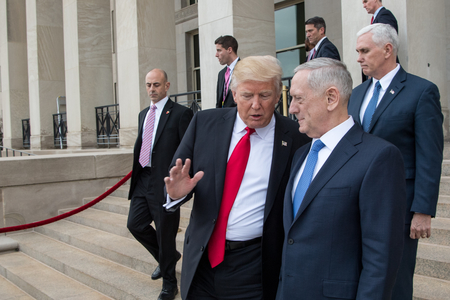Transgender Military Ban Still In Effect, Despite Defense Secretary Mattis’ Freeze
After President Trump’s impromptu tweet, declaring a ban on transgender persons in the military, the Pentagon made it clear that they would not act until a more official statement was made than a tweet that caught even them by surprise. In the wake of the tweet, and the Pentagon’s refusal to execute Trump’s wishes without more clarity, Trump released a Presidential Memorandum placing the exact terms of his ban in effect on August 25th. Around a week after that, Defense Secretary Mattis declared that transgender persons could continue serving in the military until a study on the issue had been completed determining the impact transgender persons had on the readiness and efficiency of the military.
Some in the media have mistakenly hailed this as a strike back against Trump, describing the study as a freeze on Trump’s order and Mattis as a hero standing up for transgender persons. The study is, unfortunately, nothing of the sort. Instead, Defense Secretary Mattis is simply following the terms of Trump’s order on the issue-including when and how it will take effect. This doesn’t mean that there is no chance the final order will be tempered slightly from its original version. However, the study is far from fighting back against Trump’s most recent memorandum. Let’s take a look at the contents of this presidential memorandum and figure out exactly what it does, and how Secretary Mattis’ study impacts its effect.
 Trump’s Presidential Memorandum Explained
Trump’s Presidential Memorandum Explained
The memorandum, titled as a message to the Secretary of Defense and Secretary of Homeland security, has a simple subject line of “Military Service by Transgender Individuals.” It’s effects are essentially a rollback of the June 2016 order from the Obama administration which allowed transgender persons into the military in the first place.
Citing a lack of faith in the extensive research done prior to the 2016 order, determining the costs and negative readiness impact of allowing transgender persons to enter the military to be minimal, the order has a number of effects-some immediate and some delayed. The directive refuses all Department of Defense resources to transgender persons seeking sex reassignment surgery-excluding situations where it is necessary to protect the health of the person. This basically puts health related resources out of reach for reassignment treatments and surgeries unless a transgender person has already begun the reassignment process. Other than that, the primary effect of the order is order Secretary Mattis and the Secretary of Homeland Security to begin a study of whether and how the transgender military ban should take effect for both those already enrolled and those seeking to join. The study and recommendations would be due by February 21st, 2018 and all the provisions of the ban itself-including the bar on resources for reassignment treatments-will take effect on March 23rd, 2018.
Secretary Mattis’ Study is Not a Delaying Tactic or a Step For Transgender Individuals
While Mattis’ study has been reported as a defiant step to slow down President Trump’s order, it’s simply an act following the very terms of the order. What’s more, considering the Department of Defense already did a similar study concluding that transgender persons should be allowed to enter the military, a new study is unlikely to be anything other than a step backward for transgender people in the military.
Secretary Mattis does not exactly have the strongest background on social issues. He has expressed great concern in the past over women being in combat roles, never mind transgender women. He has cited a fear that women and men would interfere with each other on the battle field, as well as a belief that women can’t perform “intimate killing.” However, it can’t be denied that-regardless of his less than stellar history on social issues-Mattis wants as strong of a military as possible.
The study begun by Secretary Mattis is not a step forward for transgender persons in the military. However, there is still a real potential that if the study reconfirms the previous study he could recommend either postponing or eliminating Trump’s ban altogether. However, we’ve got several months to wait until we know whether this is the case. What’s more, we’re very unlikely to get much indication as to what the study will recommend-or if President Trump will even care-until that time. There’s a very real possibility that the recommendation is made and Trump simply ignores it.
The over 15,000 transgender people who chose to sign up to serve their country in the last year are, once again, left with no idea how their fate will be handled. Even beyond withholding health services from these people, there’s still the question of if or how they will be discharged. As mentioned in a previous article, Don’t Ask Don’t Tell led to dishonorable discharges which publically outed many as homosexual on the very form discharging them. These transgender persons may well face a similar fate. This uncertainty, more than admitting transgender persons to the military, has the potential to undermine the military itself. The sooner a resolution on this can come, the better. For now, thousands will be left to question their fate.

Comments